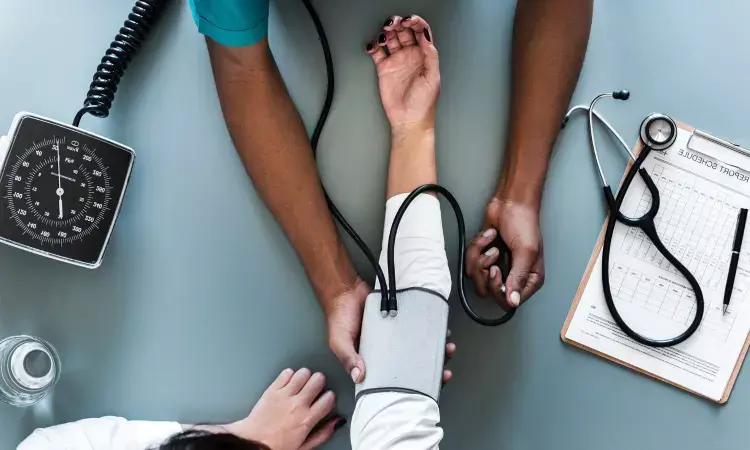- Home
- Medical news & Guidelines
- Anesthesiology
- Cardiology and CTVS
- Critical Care
- Dentistry
- Dermatology
- Diabetes and Endocrinology
- ENT
- Gastroenterology
- Medicine
- Nephrology
- Neurology
- Obstretics-Gynaecology
- Oncology
- Ophthalmology
- Orthopaedics
- Pediatrics-Neonatology
- Psychiatry
- Pulmonology
- Radiology
- Surgery
- Urology
- Laboratory Medicine
- Diet
- Nursing
- Paramedical
- Physiotherapy
- Health news
- Fact Check
- Bone Health Fact Check
- Brain Health Fact Check
- Cancer Related Fact Check
- Child Care Fact Check
- Dental and oral health fact check
- Diabetes and metabolic health fact check
- Diet and Nutrition Fact Check
- Eye and ENT Care Fact Check
- Fitness fact check
- Gut health fact check
- Heart health fact check
- Kidney health fact check
- Medical education fact check
- Men's health fact check
- Respiratory fact check
- Skin and hair care fact check
- Vaccine and Immunization fact check
- Women's health fact check
- AYUSH
- State News
- Andaman and Nicobar Islands
- Andhra Pradesh
- Arunachal Pradesh
- Assam
- Bihar
- Chandigarh
- Chattisgarh
- Dadra and Nagar Haveli
- Daman and Diu
- Delhi
- Goa
- Gujarat
- Haryana
- Himachal Pradesh
- Jammu & Kashmir
- Jharkhand
- Karnataka
- Kerala
- Ladakh
- Lakshadweep
- Madhya Pradesh
- Maharashtra
- Manipur
- Meghalaya
- Mizoram
- Nagaland
- Odisha
- Puducherry
- Punjab
- Rajasthan
- Sikkim
- Tamil Nadu
- Telangana
- Tripura
- Uttar Pradesh
- Uttrakhand
- West Bengal
- Medical Education
- Industry
Common BP drug may make leukemia more responsive to chemotherapy while protecting heart: Study

Researchers from the University of Missouri School of Medicine found that a targeted gene therapy may make acute myeloid leukemia (AML) more sensitive to chemotherapy, while also protecting the heart against toxicity often caused by cancer treatments.
Acute myeloid leukemia is the most common type of leukemia in adults and the resulting chemotherapy treatment can put patients at an increased risk for cardiac damage. Associate Professor of Medicine Dr. Xunlei Kang and PhD students Yi Pan and Chen Wang led a study looking at similarities between leukemia and cardiovascular disease. They found a shared target -- AGTR1, a receptor responsible for cell reproduction, was overabundant in the blood cells of patients with leukemia.
The researchers used losartan, a common medicine for treating high blood pressure, to inhibit the AGTR1 receptor in mice. This disrupted cancer growth, slowing the development of leukemia and led to longer survival. The next step is to further investigate losartan’s effectiveness in treating human leukemia patients.
“Mouse models of leukemia differ from human disease in several ways, including differences in the immune system, the bone marrow microenvironment and responses to treatments,” Pan said. “We will now carefully interpret and validate these findings in human studies to ensure translational relevance,” Pan said.
If these findings are confirmed in human clinical trials, the approval process to use losartan would be shorter compared to other medications, since it’s already FDA-approved and will not require comprehensive data about the drug.
“When we treated mice with the AGTR1 inhibitor losartan, we observed that this commercially available drug shows great promise in reducing AML development while protecting against chemotherapy-induced cardiotoxicity,” Kang said. “This finding shows great potential to both enhance the success of chemotherapy while protecting the heart.”
Dr. Xunlei Kang, MD, PhD is an associate professor of medicine at the MU School of Medicine and focuses his research on blood conditions and stem cell study. He received his medical degree and doctorate from Shanghai Jiao Tong University in China.
“Inhibiting AGTR1 reduces AML burden and protects the heart from cardiotoxicity in mouse models” was recently published in the journal of Science Translational Medicine. In addition to Kang, Pan and Chen, authors include research specialists Wenxuan Zhou and Yao Shi; PhD student XiaDuo Meng, Hematology and Medical Oncology fellow Yasir Muhammad, MD; Richard D. Hammer, MD, professor of clinical pathology and anatomical sciences; De-Pei Li, MD, professor of medicine and associate director of the Center for Precision Medicine; Zhenguo Liu, MD, professor of medicine and chief of cardiology; and Gerhard Hildebrandt, MD, Chief of the Division of Hematology and Medical Oncology. Bei Jia and Hong Zheng from Penn State University College of Medicine also contributed to the paper.
Dr Kamal Kant Kohli-MBBS, DTCD- a chest specialist with more than 30 years of practice and a flair for writing clinical articles, Dr Kamal Kant Kohli joined Medical Dialogues as a Chief Editor of Medical News. Besides writing articles, as an editor, he proofreads and verifies all the medical content published on Medical Dialogues including those coming from journals, studies,medical conferences,guidelines etc. Email: drkohli@medicaldialogues.in. Contact no. 011-43720751


